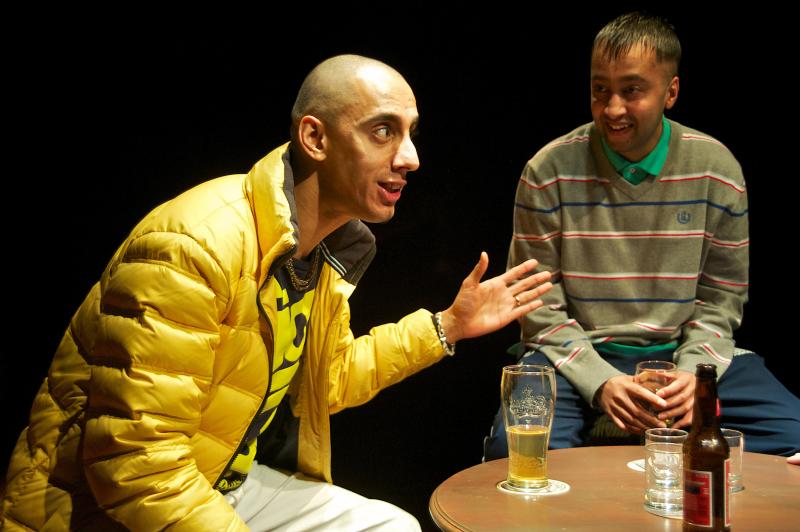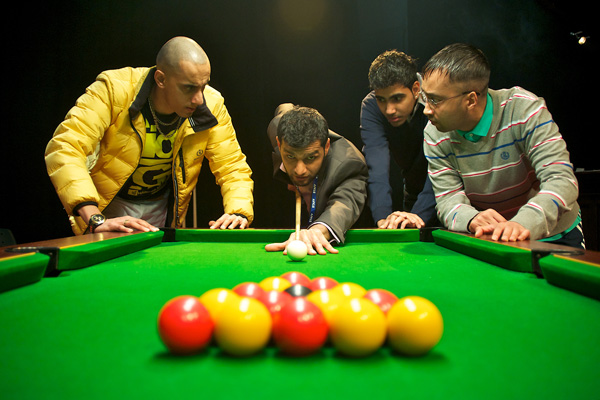Snookered, Bush Theatre | reviews, news & interviews
Snookered, Bush Theatre
Snookered, Bush Theatre
A humorous and perceptive look at masculine identity by new talent Ishy Din

What’s it like to be young, British and Muslim in the age of austerity? In an era of global financial crisis, high unemployment and shrinking pay packets, what can this country offer British Asian youth?
The play’s title refers both to players who can’t make a direct shot in a game of pool and, more metaphorically, to being in a difficult situation; being thwarted, defeated or trapped. It’s easy to see why. In a northern town, four mates - Shaf, Billy, Kamy and Mo - meet on the anniversary of their friend T’s untimely death. They get the drinks in, before settling down to an evening of pool and heart-searching. From the start, it is clear that they have known each other since school.
At times, the four men
seem to metamorphosise into a menagerie
The first to arrive is Shaf, a wideboy cabbie who has a wicked mouth and a huge appetite for drink. Next to him, Billy - who’s left home and moved to London - seems timid and restrained. You can understand why his mates mock him, calling him a coconut: brown outside, white inside. Then Kamy arrives: he works in his father’s halal butcher’s shop: he is slower than his mates, and the butt of Shaf’s jokes. Finally, Mo arrives. He’s the most solid and sensible of the four, an assistant manager of a Comet store – a respectable guy.
At times, in Din’s vivid characterisation, the four men seem to metamorphosise into a menagerie, with Shaf the leopard, cunning, charming and dangerous circling around Kamy the rabbit, gullible and scared. Meanwhile, Billy stands his ground like a zebra, an attractive mixture of black and white, while Mo starts off as a lion, proud and noble, but is finally revealed to be a snake. As the evening passes, alliances between the four shift as each makes different demands on the others, and each reveals – or learns of – a secret about the past. Each of them is changed by the experience.
Striding around the pool table with them is the theme of masculinity. Din explores the emotions of his different characters with a mix of acute perception and a real depth of understanding. The needs, jealousies and conflicts are clearly outlined. And although they were all brought up in a Muslim community, the specific cultural context of their situation - Muslim attitudes to contraception, drinking alcohol or eating pork - are pushed aside by their Britishness. Of course, the blokes' Muslim identity is often mentioned, and there's a taboo about not believing in God, but their central preoccupations are not so very different from those of any other group of young men.
 So although they occasionally wrestle with their heritage, their main preoccupations are mainstream: their love lives, their families, their struggle to survive. This is a play about Muslim men, but its emotional centre is all about doing what you desire, the longing for freedom and the frustrations of family. In this context, the truth doesn’t set you free – it’s more likely to blow apart your world. And, just like the four men, Din’s writing seems to have downed a couple of shots, as well as one pint after another, and it races through this 95-minute piece like a fever in the blood. Some jokes are spot on, potting the black with an economy of wit; others set up the next moves in the game.
So although they occasionally wrestle with their heritage, their main preoccupations are mainstream: their love lives, their families, their struggle to survive. This is a play about Muslim men, but its emotional centre is all about doing what you desire, the longing for freedom and the frustrations of family. In this context, the truth doesn’t set you free – it’s more likely to blow apart your world. And, just like the four men, Din’s writing seems to have downed a couple of shots, as well as one pint after another, and it races through this 95-minute piece like a fever in the blood. Some jokes are spot on, potting the black with an economy of wit; others set up the next moves in the game.
Not everything is a winner: there is little notice paid to the wider political picture; the theme of a crisis in masculinity feels a bit dated; and the dialogue sometimes generates more heat than light. Still, the rhythm of the evening in Iqbal Khan’s storming production is a controlled rush which looks and sounds as exciting as the text. On designer Ciaran Bagnall’s shiny pool hall set, a crack cast (pictured above right) manoeuvre around each other with a blend of intimacy and intent.
Muzz Khan’s wonderfully charismatic Shaf dominates the play with his powerful personality, while Asif Khan’s frightened Kamy is a perfect foil. Of the more serious duo, Jaz Deol’s vulnerable Billy is well matched by Peter Singh’s stolid Mo. Together, the actors help to flesh out the complexities of both masculine and Muslim identity in toady's Britain. So although Snookered never shakes off the constraints of a typical “me and my mates play”, it does deliver a memorable evening that pulses with truth and life.
rating
Explore topics
Share this article
The future of Arts Journalism
You can stop theartsdesk.com closing!
We urgently need financing to survive. Our fundraising drive has thus far raised £49,000 but we need to reach £100,000 or we will be forced to close. Please contribute here: https://gofund.me/c3f6033d
And if you can forward this information to anyone who might assist, we’d be grateful.

Subscribe to theartsdesk.com
Thank you for continuing to read our work on theartsdesk.com. For unlimited access to every article in its entirety, including our archive of more than 15,000 pieces, we're asking for £5 per month or £40 per year. We feel it's a very good deal, and hope you do too.
To take a subscription now simply click here.
And if you're looking for that extra gift for a friend or family member, why not treat them to a theartsdesk.com gift subscription?
more Theatre
 Hamlet, National Theatre review - turning tragedy to comedy is no joke
Hiran Abeyeskera’s childlike prince falls flat in a mixed production
Hamlet, National Theatre review - turning tragedy to comedy is no joke
Hiran Abeyeskera’s childlike prince falls flat in a mixed production
 Rohtko, Barbican review - postmodern meditation on fake and authentic art is less than the sum of its parts
Łukasz Twarkowski's production dazzles without illuminating
Rohtko, Barbican review - postmodern meditation on fake and authentic art is less than the sum of its parts
Łukasz Twarkowski's production dazzles without illuminating
 Lee, Park Theatre review - Lee Krasner looks back on her life as an artist
Informative and interesting, the play's format limits its potential
Lee, Park Theatre review - Lee Krasner looks back on her life as an artist
Informative and interesting, the play's format limits its potential
 Measure for Measure, RSC, Stratford review - 'problem play' has no problem with relevance
Shakespeare, in this adaptation, is at his most perceptive
Measure for Measure, RSC, Stratford review - 'problem play' has no problem with relevance
Shakespeare, in this adaptation, is at his most perceptive
 The Importance of Being Earnest, Noël Coward Theatre review - dazzling and delightful queer fest
West End transfer of National Theatre hit stars Stephen Fry and Olly Alexander
The Importance of Being Earnest, Noël Coward Theatre review - dazzling and delightful queer fest
West End transfer of National Theatre hit stars Stephen Fry and Olly Alexander
 Get Down Tonight, Charing Cross Theatre review - glitz and hits from the 70s
If you love the songs of KC and the Sunshine Band, Please Do Go!
Get Down Tonight, Charing Cross Theatre review - glitz and hits from the 70s
If you love the songs of KC and the Sunshine Band, Please Do Go!
 Punch, Apollo Theatre review - powerful play about the strength of redemption
James Graham's play transfixes the audience at every stage
Punch, Apollo Theatre review - powerful play about the strength of redemption
James Graham's play transfixes the audience at every stage
 The Billionaire Inside Your Head, Hampstead Theatre review - a map of a man with OCD
Will Lord's promising debut burdens a fine cast with too much dialogue
The Billionaire Inside Your Head, Hampstead Theatre review - a map of a man with OCD
Will Lord's promising debut burdens a fine cast with too much dialogue
 50 First Dates: The Musical, The Other Palace review - romcom turned musical
Date movie about repeating dates inspires date musical
50 First Dates: The Musical, The Other Palace review - romcom turned musical
Date movie about repeating dates inspires date musical
 Bacchae, National Theatre review - cheeky, uneven version of Euripides' tragedy
Indhu Rubasingham's tenure gets off to a bold, comic start
Bacchae, National Theatre review - cheeky, uneven version of Euripides' tragedy
Indhu Rubasingham's tenure gets off to a bold, comic start

Add comment